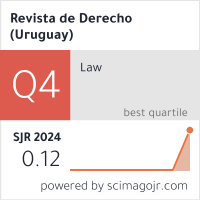Ofrecer el vientre. Consideraciones sociales y filosóficas de la gestación subrogada
DOI:
https://doi.org/10.47274/DERUM/43.7Palabras clave:
Maternidad subrogada, Mercantilización, Feminismo radical, TecnocientificismoResumen
La gestación subrogada se presenta como una técnica de reproducción asistida que asiste a ciertas personas que desean convertirse en padres. No obstante, su práctica ha generado discrepancias entre feministas. En efecto, el feminismo liberal, al abogar por la autonomía de las mujeres, defiende los vientres de alquiler como muestra de libertad. En cambio, feministas radicales y ecofeministas ven esta práctica una forma de instrumentalización y explotación de las mujeres. Este artículo busca reflexionar sobre las implicaciones sociales y filosóficas que supone la maternidad subrogada, para así mostrar lo que se deriva de mercantilizar la maternidad y lo que puede suceder con el vínculo paterno y materno-filial cuando se introduce en él la lógica tecnocientífica.
Descargas
Citas
Arneson, R. J. (1992). Commodification and Commercial Surrogacy. Philosophy and Public Affairs, 21(2), 132.
Arreguin, N. A. C. (2021). Maternidad subrogada en el mundo globalizado: Lo que toda gestante sustituta en México debe saber. Revista legislativa de estudios sociales y de opinión pública, 14(30), 169-206.
Atienza, M.J. (2023). Anne Schaub: “Todo embrión se apega naturalmente a la madre que lo lleva”. Omnes 727, 26-29.
Baby Gammy granted Australian citizenship. (2015, enero 20). BBC News. https://www.bbc.com/news/world-australia-30892258
Belliotti, R. A. (1988). Marxism, Feminism, and Surrogate Motherhood. Social Theory and Practice, 14(3), 389-417.
Ber, R. (2000). Ethical Issues in Gestational Surrogacy. Theoretical Medicine and Bioethics, 21(2), 153-169.
Berend, Z. (2010). Surrogate Losses: Understandings of Pregnancy Loss and Assisted Reproduction among Surrogate Mothers. Medical Anthropology Quarterly, 24(2), 240-262.
Berend, Z. (2012). The Romance of Surrogacy. Sociological Forum, 27(4).
Berkhout, S. G. (2008). Buns in the Oven: Objectification, Surrogacy, and Women’s Autonomy. Social Theory and Practice, 34(1), 95-117.
Brinsden, P. R. (2005). Gestational surrogacy. En Textbook of Assisted Reproductive Techniques (2.a ed.). CRC Press.
Corea, G. (1985). The mother machine. Reproductive technologies from artificial insemination to artificial wombs. Harper & Row.
De Saille, S. (2017). Knowledge as Resistance. International Network of Resistance to Reproductive and Genetic Engineering. Palgrave Macmillan.
Dworkin, A. (1981). Pornography: Men possessing women. Perigee Books.
Edelmann, R. J. (2004). Surrogacy: The psychological issues. Journal of Reproductive and Infant Psychology, 22(2), 123-136. https://doi.org/10.1080/0264683042000205981
Ekman, K. E. (2013). Being and being bought. Prostitution, surrogacy and the split self. Spinifex Press.
Fertility, H. (s. f.). Find a Surrogate | Intended Parent Intake Form | Hatch Fertility. Recuperado 5 de junio de 2023, de https://www.hatch.us/intended-parent-surrogacy-application-intake-form
Firestone, S. (1972). The dialectic of sex. The case for feminist revolution. A Bantam Book.
Hanna, J. K. M. (2010). Revisiting Child-Based Objections to Commercial Surrogacy. Bioethics, 24(7), 341-347.
Haraway, D. (2016). A Cyborg Manifesto. Science, Technology, and Socialist- Frminism in the Late Twentieth Century. University of Minnesota Press.
Heidegger, M. (1994). La cuestión de la técnica. En Conferencias y artículos. Odós.
Holland-Cunz, B. (1996). Ecofeminismos. Ediciones Cátedra.
Horkheimer, M. (2000). El anhelo de lo totalmente otro. Entrevista con Helmut Gumnior. En Anhelo de justicia (pp. 165-183). Trotta.
Horkheimer, M. (2001). Autoridad y familia y otros escritos. Paidós.
Horkheimer, M. (2003). Teoría crítica. Amorrortu editores.
Horkheimer, M. (2016). Crítica de la razón instrumental. Trotta.
Jadva, V., Murray, C., Lycett, E., MacCallum, F., & Golombok, S. (2003). Surrogacy: The experiences of surrogate mothers. Human Reproduction, 18(10), 2196-2204.
Ince, Susan (1984) ‘Inside the surrogate industry’ in Arditti, Rita, Renate Duelli Klein and Shelley Minden (eds) Test-Tube Women: What future for motherhood? Pandora Press, Unwin Hyman, London, Winchester, MA and Sydney.
Klein, R. (2017). Surrogacy: A Human Rights Violation. Spinifex Press.
Klein, R. (2019). Broken Bonds. Surrogate Mothers Speak Out. Spinifex Press.
Lorenceau, E. S., Mazzucca, L., Tisseron, S., & Pizitz, T. D. (2015). A cross-cultural study on surrogate mother’s empathy and maternal–foetal attachment. Women and Birth, 28(2), 154-159.
Mies, M. (1985). ‘Why do we need all this?’ A call against genetic engineering and reproductive technology. Women’s Studies International Forum, 8(6), Article 6.
Newton, N. (2003). The Primal Wound. Gateway Press.
Pande, A. (2009). “It May Be Her Eggs But It’s My Blood”: Surrogates and Everyday Forms of Kinship in India. Qualitative Sociology, 32(4), 379-397.
Pande, A. (2010). Commercial Surrogacy in India: Manufacturing a Perfect Mother-Worker. Signs: Journal of Women in Culture & Society, 35(4), 969-992.
Pande, A. (2014). Wombs in Labor. Columbia University Press.
Ragoné, H. (1994). Surrogate Motherhood: Conception in the Heart. Routledge.
Rita Arditti, Renate Duelli Klein, & Shelley Minden. (1984). Test-tube women: What future for motherhood? Pandora Press.
Sandel, M. (2007). The case against perfection: Ethics in the age of genetic engineering. Belknap Press if Harvard University Press.
Shiva, V., & Mies, M. (1998). La praxis del ecofeminismo. Icaria.
Spar, D. L. (2006). The Baby Business. How money, science and politics drive the commerce of conception. Harvard Business School Press.
Surrogate Mother Selection. (s. f.). New Life Georgia. Recuperado 5 de junio de 2023, de https://www.newlifegeorgia.com/surrogate-mother-selection/
Tieu, M. M. (2009). Altruistic surrogacy: The necessary objectification of surrogate mothers. Journal of Medical Ethics, 35(3), 171-175.
van den Akker, O. B. A. (2007). Psychosocial aspects of surrogate motherhood. Human Reproduction Update, 13(1), 53-62.
Publicado
Cómo citar
Número
Sección
Licencia
Derechos de autor 2023 Gabriela Caviedes Thomas, Cecilia Gallardo Macip

Esta obra está bajo una licencia internacional Creative Commons Atribución 4.0.






















 Esta obra está bajo una licencia de
Esta obra está bajo una licencia de 